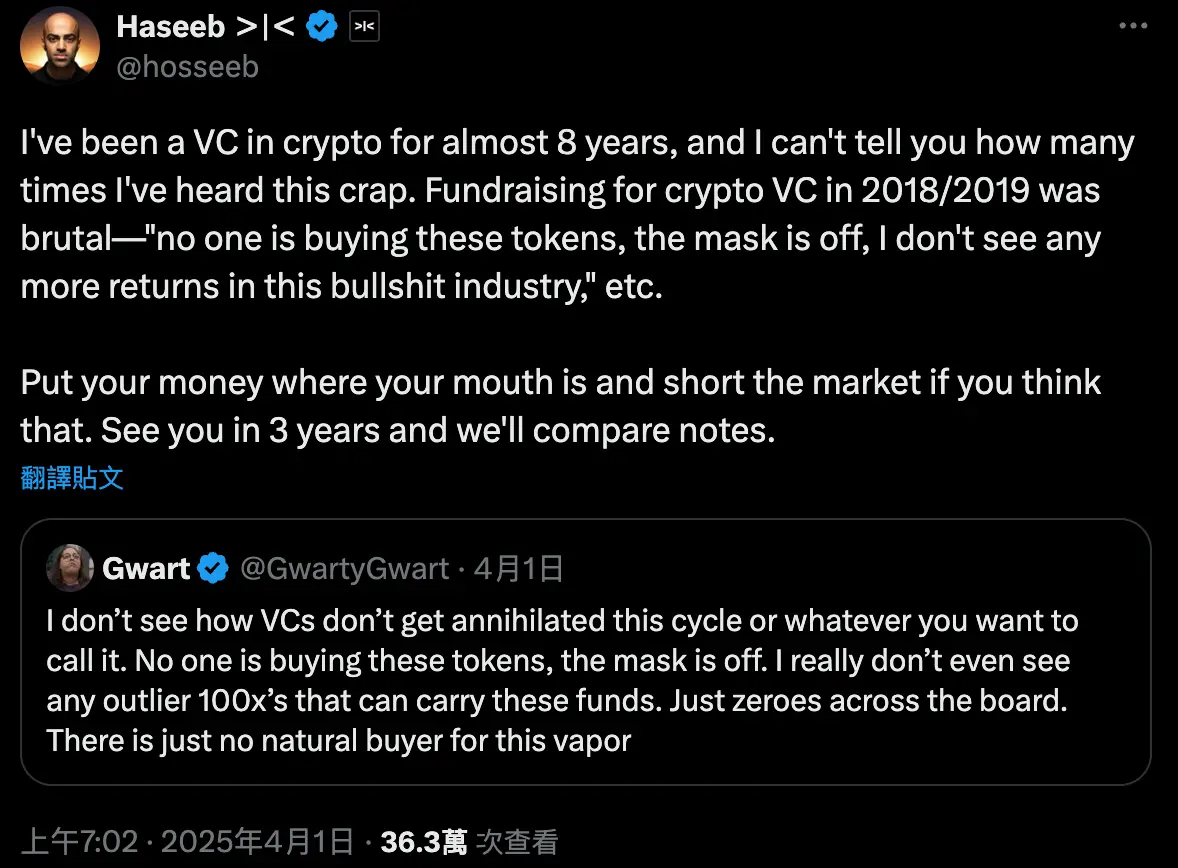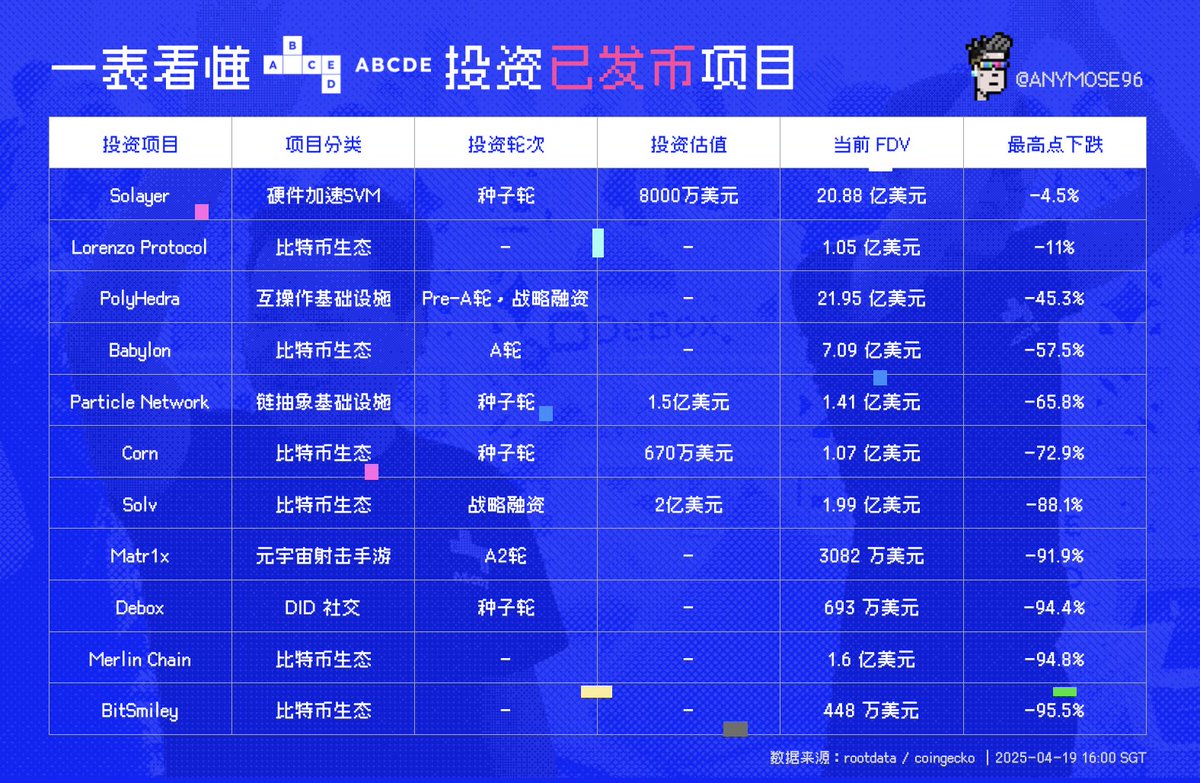ABCDE stops investing in Vernal, crypto VC starts transformation for survival?
Author: Patti, ChainCatcher
Editor: TB, ChainCatcher
Last weekend, Du Jun, co-founder of ABCDE, officially announced that "ABCDE Capital has stopped investing in new projects and suspended the fundraising plan for the second phase of the fund," and briefly summarized the investments of the ABCDE Phase I fund: nearly $40 million invested, supporting over 30 projects, with more than 50% of projects led.
 Du Jun's tweet caused an uproar on X.
Du Jun's tweet caused an uproar on X.
A Mix of Pessimism and Helplessness
Some believe this reflects the extreme deterioration of the primary investment environment in the crypto market, where investment institutions find it difficult to reverse the downturn even with full effort; others analyze that this may be a helpless move by investors to cut losses in time.
In the view of investment blogger Kay Capital, Du Jun's announcement to stop investing is likely due to the low returns on this round of Crypto VC investments. He pointed out: "The passing level for the last round of Crypto VC was a 5-10x return, excellent level was 20-50x return, and top level was over 100x return," but this round of Crypto VC only reached a passing level of a 50% loss, with the excellent level barely breaking even or making a small profit, while the top level might only have a chance to double down if invested in projects like Sui that unlocked in a bull market.
Kay Capital further analyzed the high risks and volatility currently faced by Crypto VCs, as well as the entire process of VC losses. He mentioned: "Assuming a 4-year investment cycle, most funds need to be deployed within 2 years," and at this stage, we are in the third year after the 2022 bear market, with some VCs falling into a phase of having no money to invest.
Moreover, not all invested projects will be released; many projects carry the risk of being unreleased, which means that VC investments cannot flow back to create profits. Among the projects that can be released, TGE unlocks have also become one of the reasons why VC investments are difficult to recover. Kay Capital stated: "Many projects need to wait a year to truly become liquid, and by then, the projects and market makers (MM) have long 'handed over' the projects." 
Additionally, crypto blogger DeFi Teddy posted on social media pointing out that the current Crypto VC model faces multiple issues, including a lack of innovation, severe homogenization; creating a false sense of prosperity through airdrops; overvaluation, low circulation, and retail investors becoming the bag holders.
So, is the situation really that dire? Is the position of Crypto VCs truly so pessimistic?
ABCDE's Transformation and the Launch of Vernal
In fact, during the period when ABCDE announced the halt of new project investments and the second phase of fundraising, a new incubator product, Vernal, has already begun to take shape. As Du Jun said: "I want to change my approach and rethink how to participate in the industry's development." He also stated: "This is not a matter of funds or capabilities, but a choice of direction," and the new product Vernal may become Du Jun's new direction.

Subsequently, Du Jun briefly shared the planning for "Vernal" in a new tweet: launching a new incubator brand Vernal; continuing to engage in primary market investments; researching secondary trading, and inviting crypto enthusiasts to join his team.
The Financing Environment Remains Vibrant
In fact, despite seemingly negative market sentiment, Crypto VCs still maintain a positive financing environment.
According to RootData, as of now, there have been 13 seed round financings in the crypto field this month, with crypto-native funds like a16z and Dragonfly still active in crypto investments.

Among them, the $15.8 million seed round financing of the stablecoin blockchain startup Codex, led by Dragonfly Capital, is the largest amount, with participation from Coinbase, Circle, Cumberland, Wintermute, and Selini Capital, while Dragonfly invested about $14 million in this round.
Similarly, just in April, a16z participated in 6 crypto project financings, covering fields like AI and social media, and market news disclosed that a16z is seeking to raise $20 billion for its largest fund.
In response to the market's pessimistic views on the crypto industry, Dragonfly managing partner Haseeb Qureshi also responded, stating that as a venture capitalist in the crypto industry for nearly 8 years, he has repeatedly heard similar remarks like "no one will buy these tokens," "the truth of the industry has been revealed," and "there will be no more returns."

He noted that fundraising for crypto VCs was extremely difficult in 2018/2019, but reality has proven that cycles will restart. He emphasized: "If you really don't believe in crypto, then put your money where your mouth is and short the market. Let's compare results in three years."
Survival Strategies Amidst Liquidity Drought
In reality, as a large amount of hot money flows from VC tokens to Memes, the already nearly exhausted liquidity has become precarious, plunging the crypto market into a "wave of altcoin project collapses."
According to crypto KOL @Anymose 96's statistics, the price of tokens from projects invested by ABCDE has dropped by as much as 95.5%, which may also be one of the factors for ABCDE's transformation.
This is also the dilemma faced by capital institutions at the upstream of the ecosystem, making a transformative breakthrough urgent.
Capital institutions represented by ABCDE are transforming, maintaining primary investment operations while actively expanding into secondary market investments and trading, striving for better market performance and capital returns.
Meanwhile, established native crypto capitals like a16z and Dragonfly Capital are turning their attention to hot fields such as AI and stablecoins, seeking more development opportunities through broader attention, capital scale, and application products.
Haseeb delivered a speech on AI Agents in Denver this March, discussing the impact of AI on Crypto and expectations for the future of AI and Crypto, concluding that "the intersection of cryptocurrencies and AI will be very rich in the future, but this largely depends on the development of AI and its integration with crypto," indicating that "AI + Crypto" will become an important investment target for Dragonfly in the future.
Conclusion
How to survive amidst liquidity drought has become a question many Crypto VCs are pondering.
It is evident that the AI track, which carries the future of humanity, has become a natural link connecting web2 and crypto liquidity, and "AI + Crypto" is gradually becoming an important narrative for VCs to obtain liquidity.
If we view crypto as a circle, then ABCDE's transformation seems to be creating liquidity within the circle, while a16z and Dragonfly Capital are seeking more liquidity from outside the circle.
How the landscape of the crypto capital market will evolve in the future, and whether capital institutions can find new survival paths amid transformation, remains uncertain.
However, what is certain is that the crypto capital market is undergoing unprecedented changes and challenges, and capital institutions need to continuously adjust their strategies to adapt to market changes in order to survive and achieve sustainable development in fierce competition.













